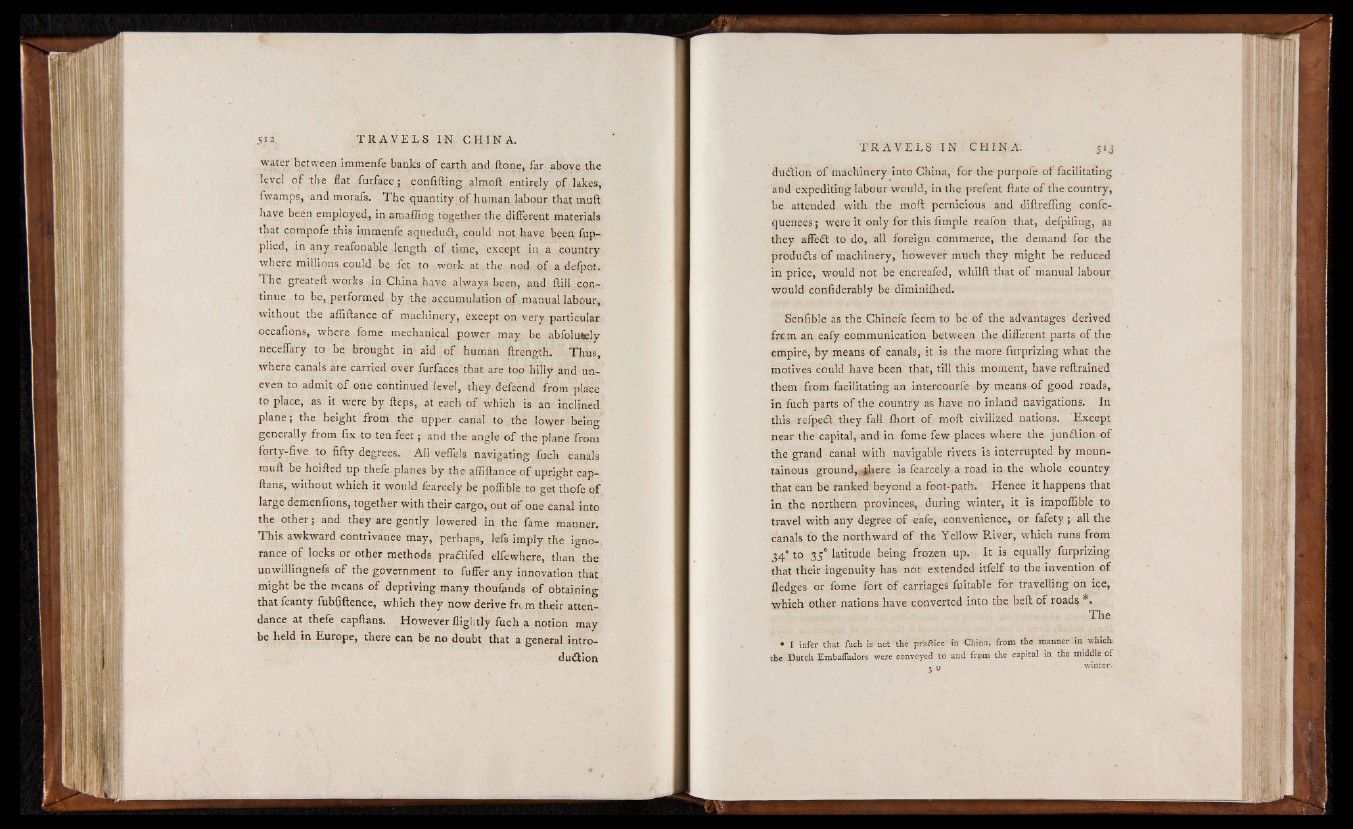
water between immenfe banks o f earth and ilone, far above the
level o f the flat furface ; confifting almoft entirely p f lakes,
fwamps, and morafs. The quantity o f human labour that muft
have been employed, in amafling together the different materials
that compofe this immenfe aqueduff, could not have been fup-
plied, in any reafonable length o f time, except in a country
where millions could be fet to work at the nod o f a defpot.
The greateft works in China have always been, and ftill continue
to be, performed by the accumulation o f manual labour,
without the affiftance o f machinery, except on very particular
occafions, where fome mechanical power may be abfoluiely
neceflary to be brought in aid o f human ftrength. Thus,
where canals are carried over furfaces that are too hilly and uneven
to admit o f one continued level, they defcend from place
to place, as it were by fteps, at each o f , which is an inclined
plane; the height from the upper canal t o , the lovyer being
generally from fix to ten fe e t; and the angle o f the plane from
forty-five to fifty degrees. All veffels navigating fuch canals
muft be hoifted up thefe planes by the affiftance o f upright cap-
ftans, without which it would fcarcely be poffible to get thofe o f
large demenfions, together with their cargo, out o f one canal into
the other; and they are gently lowered in the fame manner.
This awkward contrivance may, perhaps, lefs imply the ignorance
o f locks or other methods praftifed elfewhere, than the
unwillingnefs o f the government to fuffer any innovation that
might be the means o f depriving many thoufands o f obtaining
that fcanty fubfiftence, which they now derive frcm their attendance
at thefe capftans. However ilightly fuch a notion may
be held in Europe, there can be no doubt that a general introduction
du£tion o f machinery into China, for the purpofe o f facilitating
and expediting labour would, in the prefent ftate o f the country,
be attended with the moft pernicious and diftreffing confe-
quences; were it only for this fimple reafon that, defpifing, as
they affe£t to do, all foreign commerce, the demand for the
produifts o f machinery, however much they might be reduced
in price, would not be encreafed, whilft that o f manual labour
would confiderably be diminiihed.
Senfible as the Chinefe feem to be o f the advantages derived
frcm an eafy communication between the different parts o f the
empire, by means o f canals, it is the more furprizing what the
motives could have been that, till this moment, have reftrained
them from facilitating an intercourfe by means o f good roads,
in fuch parts o f the country as have no inland navigations. In
this refpeft they fall Ihort o f moft civilized nations. Except
near the capital, and in fome few places where the junilion o f
the grand canal with navigable rivers is interrupted by mountainous
ground, there is fcarcely a road in the whole country
that can be ranked beyond a foot-path. Hence it happens that
in the northern provinces, during winter, it is impoflible to
travel with any degree o f e’afe, convenience, or fafe ty; all the
canals to the northward o f the Yellow River, which runs from
34” to 35° latitude being frozen up. It is equally furprizing
that their ingenuity has not extended itfelf to the invention of
fledges or fome fort o f carriages fuitable for travelling on ice,
which other nations have converted into the beft o f roads * .
The
* I infer that fuch is 'not the practice in China, from the manner in which
the Dutch Embaffadors were conveyed to and from the capital in the middle of
j u winter.